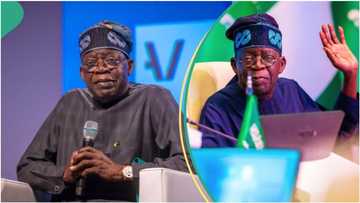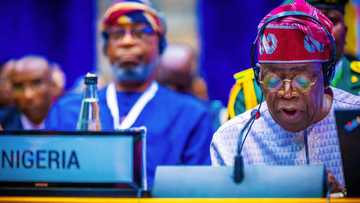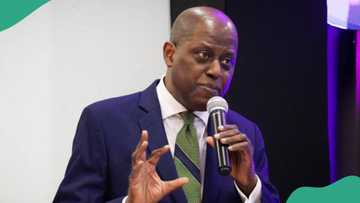2024 Appropriation Bill: Why Tinubu’s Budget Lacks Strategic Plan To Improve Nigerians
- President Bola Tinubu faces a litmus test to prove doubters and opposition wrong after presenting the N27.5 trillion 2024 appropriation bill
- There are criticisms that the budget lacks the potency to curb the sufferings and hardship of Nigerians
- Executive director of the Civil Society Legislative Advocacy Centre (CISLAC), Auwal Musa Rafsanjani, said the budget needed more clarity in strategically delivering its objectives
Legit.ng journalist Segun Adeyemi has over 9 years of experience covering political events, civil societies, courts, and metro
FCT, Abuja - The N27.5 trillion 2024 appropriation bill presented by President Bola Ahmed Tinubu has been criticised for lacking a strategic plan to improve and impact the lives of Nigerians.
The budget, tagged ‘Budget for the Renewed Hope’, was presented before the national assembly on Wednesday, November 29.
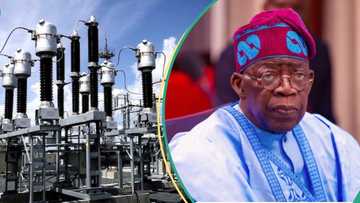
Read also
Nigerians to enjoy more power supply as Tinubu inks deal to boost national grid by 12,000MW
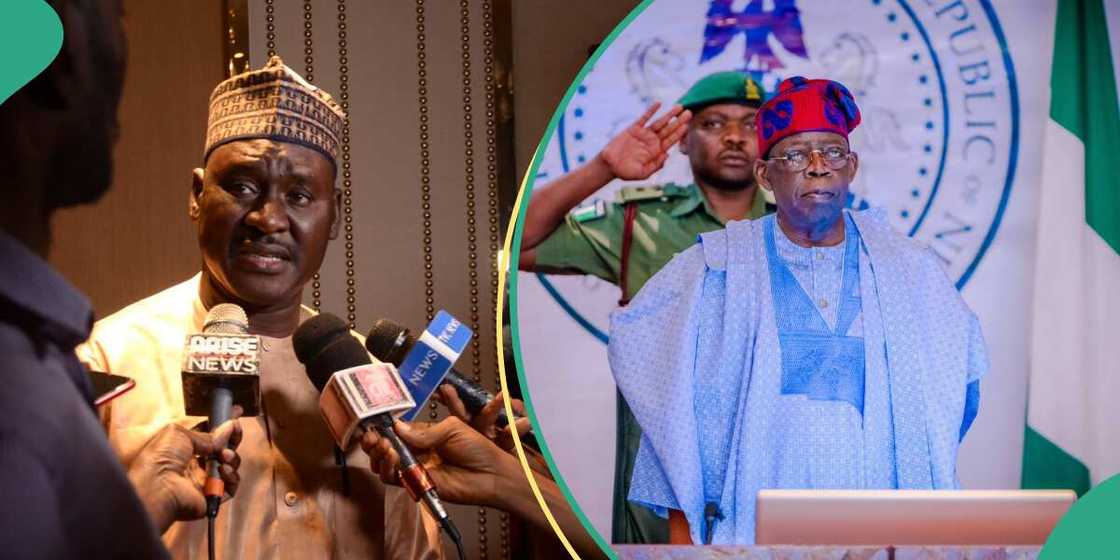
Source: Facebook
This comes after both houses of the National Assembly approved the 2024-2026 Medium Term Expenditure Framework and the Fiscal Strategy Paper (FSP), the 2024 budget fiscal year is set to have a total expenditure of N26 trillion, accompanied by a borrowing proposal of N7.8 trillion.
PAY ATTENTION: Сheck out news that is picked exactly for YOU ➡️ find the “Recommended for you” block on the home page and enjoy!
In a brief chat with Legit.ng, the chairman of the Board of Amnesty International, Nigeria, and executive director of the Civil Society Legislative Advocacy Centre (CISLAC), Auwal Musa Rafsanjani, said the budget does not have the potency to curb the hardship of Nigerians who are already plunged into deplorable conditions worsened by the unplanned removal of petrol subsidies.
He said:
"The second and third interventions were to seek approvals of prebendal Supplementary budgets that profligately appropriated scarce resources to different arms of government and served more as forms of political patronage.
"Both budgets equally lacked clarity in the strategic delivery of their objectives and sincerity of purpose and both were hastily approved by the National Assembly."
CISLAC boss questions process of budget approval by NASS
Rasfasanjani emphasised the importance of scrutinising President Tinubu's budget, thoroughly evaluating its goals, alignment with the nation's perceived priorities, financial viability, feasibility, and public acceptance.
The proposed budget aims to solidify macroeconomic stability, decrease the deficit, and boost capital spending in alignment with the Administration's eight priority areas.
Rasfasanjani praised the objectives as commendable, underscoring the significance of the Budget Minister's detailed breakdown for a comprehensive understanding.
Rafsanjani said:
"Firstly, while the borrowing plan remains the same at N7.8 trillion, the total spending for the 2024 fiscal year has increased from N26 trillion in the 2024-2026 Medium Term Expenditure Framework and the Fiscal Strategy Paper (FSP) as passed by both chambers of the National Assembly, to N27.5 trillion.
"This was after a revision of the oil price assumption up by $4 per barrel to $77.96 and the assumed currency value down to 750 naira per dollar, compared with 700 naira.
"To meet the initially proposed average GDP growth over the next four years, we however have to start looking to achieve the ambitious crude oil production aspirations of the Petroleum Industry Act (PIA) beyond the daily production estimate of 1.78 million barrels.
"This can be achieved by increased investments in oil and gas and a determination to reduce crude oil theft and improve metering infrastructure."
Focus and revitalisation of refineries
Rafsanjani has emphasized the need for the government to focus on restoring the functionality of our refineries to their optimal levels and supporting modular refineries to ensure energy security in terms of availability, accessibility, and affordability.
Alongside these efforts, he suggested that the government should prioritize non-oil revenue by making significant and transparent investments in human and social capital development.
Moreover, Rafsanjani pointed out a disparity between the projected GDP growth rates of 3.76%, 4.22%, and 4.78% for 2024, 2025, and 2026, respectively, and the initially promised and possibly unrealistic average GDP growth rate of 6% over the next four years.
Rafsanjani said:
"While the projections are reasonable, and it is a preferred thrust to underestimate revenue as it is easier to manage surplus than otherwise, the projections show a lack of effort of the government to assert itself on an economy with an almost equal population growth. These projections do not offer much “hope” in changing the conditions of 133 million poor Nigerians.
"Commendably, the 2024 budget deficit projected to be N9.18 trillion, which is 3.88% of GDP, is significantly lower than the 2023 level of 6.11%, despite being higher than the 3% threshold stipulated in the Fiscal Responsibility Act (FRA), 2007."
Putting Nigerians first
Rafsanjani emphasised the importance of going beyond mere numerical figures that may not resonate with the average person.
He stressed the need for clear strategies to help achieve the budgetary assumptions under our influence, including projected revenue and planned expenditure.
He said:
"Nigerians have suffered enough and cannot continue to tighten their belts for a few to enjoy.
"We call on the government to stay true to its social contract with the people and the people to sustain demands of accountability from the government.
"The new government is yet to prove itself, and statements, proposals, projections and even budgets are not enough. Nigerians will only respond to visible change in the quality of their lives. Nigerians deserve more than hope and in all of this “sincerity of purpose” is key."
IMF offers Nigeria and other African countries conditions to clear debt
Meanwhile, the International Monetary Fund (IMF) proposes a debt swap deal to Nigeria and other debtor countries worldwide.
The IMF MD, Kristalina Gerogieva, said the agreement had not been concretised yet but offered hope for debt relief.
Nigeria's president, Bola Tinubu, recently asked the National Assembly to approve another $8.6 billion.
PAY ATTENTION: Unlock the best of Legit.ng on Pinterest! Subscribe now and get your daily inspiration!
Source: Legit.ng

Segun Adeyemi (Current Affairs and Politics Editor) Segun Adeyemi is a journalist with over 9 years of experience as an active field reporter, editor, and editorial manager. He has had stints with Daily Trust newspaper, Daily Nigerian, and News Digest. He currently works as an editor for Legit.ng's current affairs and politics desk. He holds a degree in Mass Communication (Adekunle Ajasin University). He is a certified digital reporter by Reuters, AFP and the co-convener of the annual campus journalism awards. Email: segun.adeyemi@corp.legit.ng.

Auwal Musa Rafsanjani (Human rights activist) Auwal Musa Rafsanjani is the chairman of the Board of Amnesty International, Nigeria, and executive director of the Civil Society Legislative Advocacy Centre (CISLAC). Rafsanjani has been a member of Civil Liberties Organization and a member of The Center for Democracy and Human Rights. He was a founding member of Campaign for Democracy, led by late Beko Ransome Kuti, Democratic Alternative, also a member and coordinator of United Action for Democracy (UAD) led by Olisa Agbakoba.


